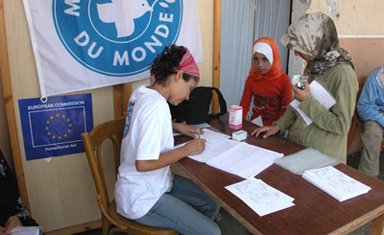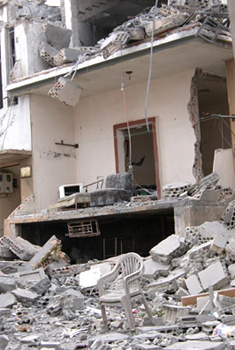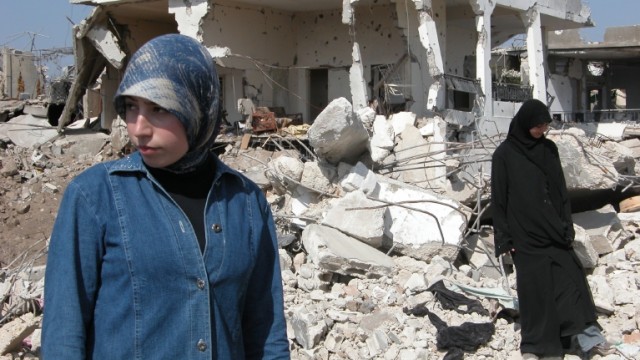Markaba, Southern Lebanon, at the border with Israel: “This is how we have survived”

Photo : EC/ECHO/Daniela Cavini
MARKABA. Piles of rubble; the sight that greets returnees to the village of Markaba. There is no water or electricity either. The school is badly damaged, the health centre unusable.
Markaba, at the eastern border between Lebanon and Israel, once had 3,000 inhabitants and a normal farming life. Today the municipality is trying to contact the expatriate Lebanese who own summer houses in the vicinity and to strike deals to rent them. The figures tell the story: out of Markaba’s 700 dwellings, 30% have been razed to the ground, and another 40% are badly damaged. As a result, people squeeze in wherever they can. But the sanitary situation is critical and conditions could easily worsen. Water pipes were hit, mainly in the last few days of the conflict in Lebanon. The repair of the distribution network is a top priority for the village.
Household water storage tanks have also been lost, as well as the equipment for waste collection. Shops and markets no longer exist. And the unemployment rate has rocketed: the harvesting season has passed with crops ruined, because they couldn’t be gathered during the fighting. Most of the livestock are gone as well.
People are getting help; food parcels and bottled water are distributed on a regular basis, while water trucking ensures a basic minimum for individual households.
The fighting may have stopped, but victims of the conflict in Lebanon still face urgent humanitarian needs.

Photo : EC/ECHO/Daniela Cavini
“Things are difficult, but part of my home is still standing. I’m one of the lucky ones, so I cannot complain”, says Sabah Hammoud. This 43-year old mother of five speaks to us as she queues for a health check. A mobile clinic of Médecins du Monde (MDM) – supported by the Commission Humanitarian Aid department – has just reached the village, and patients are being visited in one of the few intact buildings available to the municipality. The line is long; those waiting are mostly old people. “Some of them didn’t leave the village during the war explains Teresa Gonzales of MDM. Some simply could not afford to move. Others couldn’t take the risk. They are suffering from chronic diseases such as heart or circulation problems. They ran out of drugs during the conflict, but now they can finally be treated”.
The number of cases of diarrhoea among children is increasing. The wealthiest families haven’t brought their children back with them, but the poorest ones cannot afford ‘distance tutoring’. They have no choice but to live with the poor sanitary conditions – and the consequences.
Psychological troubles are also becoming common. Some of the elderly cannot recollect whether they left or stayed during the fighting.
Sabah Hammoud remembers all too well. “After the conflict erupted, we remained in Markaba for about 20days but the situation became unbearable. We had almost nothing to eat, the children were terrified and things were getting more dangerous by the day. We didn’t want to leave, but eventually, we had to. ”. Like many others, the Hammouds made a dangerous car trip to Beirut and found refuge in a school. And like many others, they came back right after the cease-fire to a landscape re-drawn by bombs and shells. “Where do you start when your house has been badly damaged and you stand in front of it for the first time?“ Sabah asked. “I fought back the tears because I didn’t want my children to see me crying.”
“The first thing we did was to look for our neighbours: we wanted to know who was alive and who was dead, who had returned and who had not. Then we tried to work out where to live; which part of the house was safe enough to be occupied. And finally, we dared to enter, to gather up what was left that could be used again. There wasn’t much, really. Then we started to clean up. You know, we are strong people. We will rebuild our lives, as we did before”.
Daniela Cavini
ECHO Regional Information Officer – Amman

